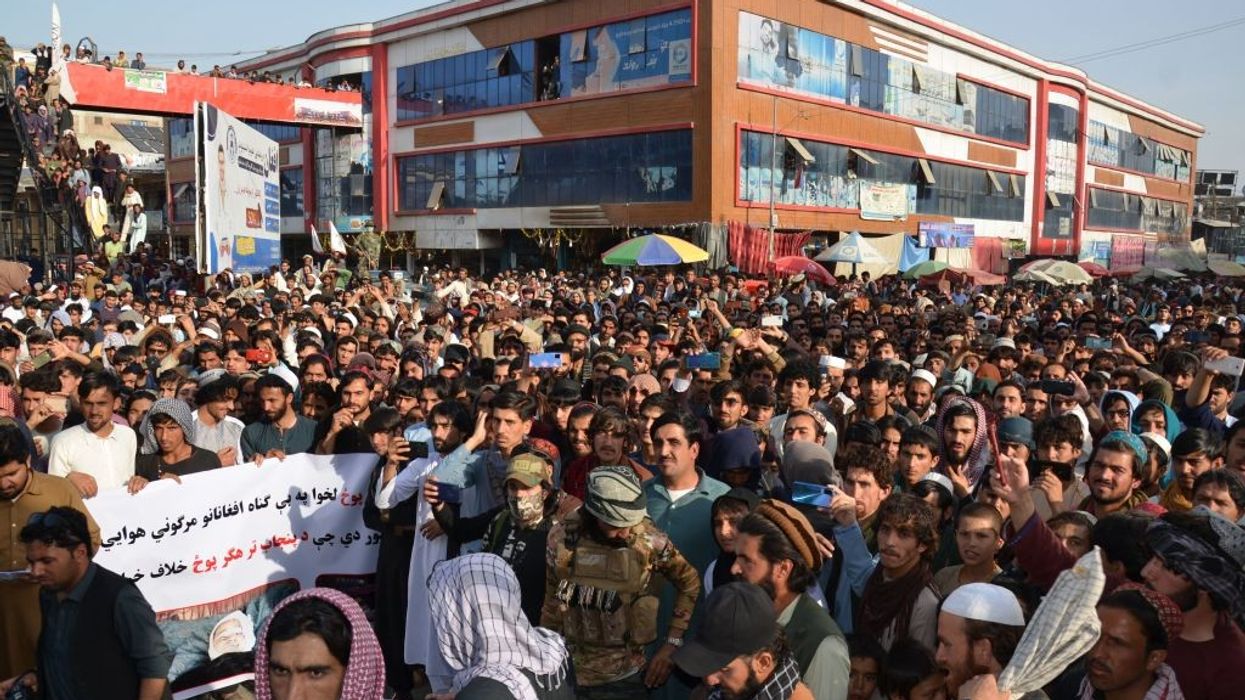THE DEATH toll from Pakistani military airstrikes in the eastern Afghanistan provinces of Khost and Kunar has jumped to at least 47, officials said Sunday (17), as Islamabad urged Kabul to act against militants launching attacks from Afghan soil.
Border tensions between Pakistan and Afghanistan have risen since the Taliban seized power last year, with Islamabad claiming militant groups are carrying out regular attacks from the neighbouring country.
The Taliban deny harbouring Pakistani militants but are also infuriated by a fence Islamabad is erecting along their 2,700-kilometre (1,600-mile) border.
Tensions between the two neighbours deepened after Saturday's (16) pre-dawn air assault which Afghan officials now claim was carried out by Pakistani military helicopters.
The airstrikes hit residential houses in Khost and Kunar along the border, Afghan officials said. Earlier, officials had said Pakistani forces had fired rockets.
"Forty-one civilians, mainly women and children, were killed and 22 others were wounded in airstrikes by Pakistani forces near the Durand line in Khost province," Shabir Ahmad Osmani, director of information and culture in Khost said.
Najibullah, an official with the Ministry for Promotion of Virtue and Prevention of Vice in Khost said the death toll in the province was 48.
"Twenty-four people were killed from one family itself," he said.
Jamshid, a tribal leader from Khost, also confirmed that more than 40 people had died.
"I went yesterday with several people to donate blood for treating the wounded in the Khost strike," Jamshid said.
Another government official in Khost on condition of anonymity said he saw "42 graves" of people killed, adding that a few people were missing.
"Faces and bodies of some were charred and beyond recognition," Abdul Wahab, a religious scholar from Khost who helped bury some victims said.
TOLO News, Afghanistan's leading private TV channel, continued to show gruesome footage of scattered blood and debris of damaged houses in the assault in Khost.
On Saturday, officials had said five children and a woman had been killed in similar strikes in Kunar.
'Stern actions'
The Pakistani military has so far not offered any comment on the strikes, but on Sunday the foreign ministry in Islamabad urged the Taliban authorities in Kabul to rein in the militants.
"Pakistan requests the sovereign Government of Afghanistan to secure the Pakistan-Afghan border region and take stern actions against the individuals involved in terrorist activities in Pakistan," Pakistan's foreign ministry said.
It said seven Pakistan soldiers were killed in the North Waziristan district on Thursday (14) by "terrorists operating from Afghanistan".
Areas along the border have long been a stronghold for militant groups such as the Tehreek-e-Taliban Pakistan (TTP), which operates across the porous frontier with Afghanistan.
"Unfortunately, elements of banned terrorist groups in the border region, including TTP, have continued to attack Pakistan's border security posts, resulting in the martyrdom of several Pakistani troops," the foreign ministry said.
The Afghan Taliban and the TTP are separate groups in both countries, but share a common ideology and draw from people who live on either side of the border.
Thousands of people usually cross the border daily, including traders, Afghans seeking medical treatment in Pakistan, and people visiting relatives.
Last month the TTP announced it would launch an offensive against Pakistani security forces from the first day of the Muslim holy month of Ramadan.
The TTP are pressuring the Pakistani authorities to allow militants to return to their hometowns with impunity after foreign fighters were told by the Afghan Taliban to leave Afghanistan.
Afghanistan's Taliban government issued a warning to Pakistan after Saturday's assault.
"This is a cruelty and it is paving the way for enmity between Afghanistan and Pakistan," Taliban government spokesman Zabihullah Mujahid said late on Saturday.
"The Pakistani side should know that if a war starts it will not be in the interest of any side."
The airstrikes triggered protests in Khost and some other provinces over the weekend.
(AFP)
Afghanistan death toll in 'Pakistan strikes' rises to 47




